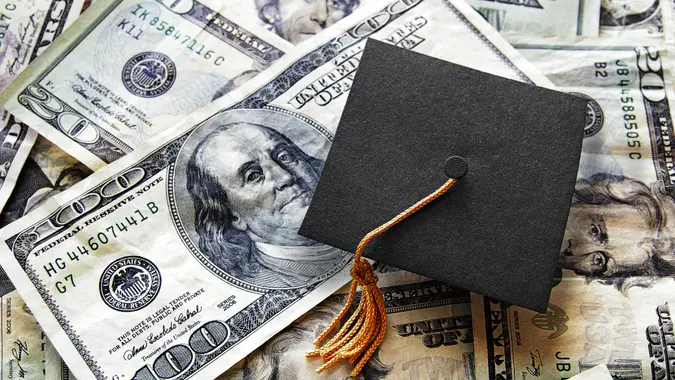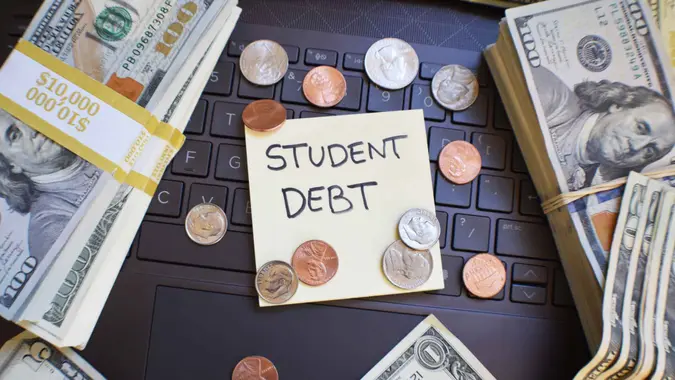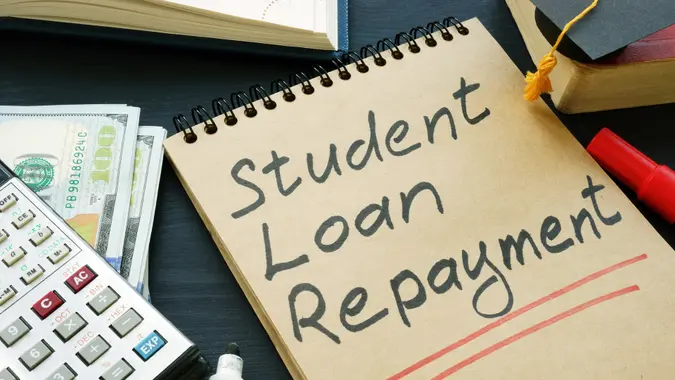Do Your Student Loans Affect Your Credit?

Commitment to Our Readers
GOBankingRates' editorial team is committed to bringing you unbiased reviews and information. We use data-driven methodologies to evaluate financial products and services - our reviews and ratings are not influenced by advertisers. You can read more about our editorial guidelines and our products and services review methodology.

20 Years
Helping You Live Richer

Reviewed
by Experts

Trusted by
Millions of Readers
Whether you’re deciding if you should take out loans for a new degree or you’re starting to pay back your debt, it’s important to consider how your student loans affect your credit.
If you make your payments on time, they can actually boost your credit score. Here’s what you need to know.
How Credit Scores Work
Your credit score measures your creditworthiness. It’s a three-digit number ranging from 350 to 850 determined by Fair Isaac Corp., known as FICO. Most financial institutions use the FICO score.
Lenders use credit scores to learn how likely you will pay your loan on. A high FICO score makes you seem less risky to lenders. This is also known as your creditworthiness.
Your credit score is based on a review of your credit history. It includes your:
- Total number of accounts
- Repayment history
- Total debt levels
- Other factors
The three major credit bureaus in the United States are Equifax, Experian and TransUnion. Each agency may calculate your credit score differently.
How Does a Student Loan Affect Your Credit Score?
How you handle your student loan determines positive and negative impacts on your credit score.
Positive Impact on Your Credit Score
- Build a credit history. A student loan helps establish a credit history and can become your first major credit account, especially if you have never had a credit card.
- Establishes credit length. The length of your credit history impacts your credit score. Keeping an account in good standing over long periods can help establish a more extended credit history.
- Timely payments improve your credit score. Making timely payments is a major contributing factor to your total credit score.
Negative Impact on Your Credit Score
- Missed or late payments will lower your score. If you miss or are late in making a payment, this will negatively affect your credit score. Every missed payment may stay on your credit report for up to seven years. This causes a large dip in your credit score.
- Loan default has a significant impact. If you fail to make payments for 270 days on a federal student loan, it will go into default. This default can result in long-term credit damage. You may be subject to collections, wage garnishment or legal action.
- A high loan balance makes you a risky borrower. Lenders may see a high student loan balance as a red flag. This balance impacts your ability to qualify for additional loans or credit since you’re already carrying debt.
Student Loan Types and Effects on Your Credit Score
Students typically apply for a federal or private loan to pay for their undergraduate or graduate education. Private and federal loans generally affect your credit score the same way: If you pay them on time, it will help your score. If you don’t, it will hurt your score.
However, unlike federal loans, most financial institutions require a credit check for private loans. This inquiry can temporarily dip your credit score.
| Feature | Federal Loans | Private Loans |
|---|---|---|
| Reported to Credit Bureaus | Yes | Yes |
| Interest Rates | Fixed, usually lower rates | Can be fixed or variable, based on credit score |
| Repayment Options | Income-based plans available | Varies by lender |
| Loan Forgiveness | Possible | Rarely Available |
How to Keep Your Student Loans from Hurting Your Credit
Managing your student loan debt is integral in protecting your credit score. Here are seven ways to manage your student loans to protect your credit:
1. Make Timely Payments
Payment history is the most significant factor in determining your credit score, accounting for 35% of the total. Set up automatic payments or calendar reminders to ensure you make your payments on time.
2. Consider a Deferment or Forbearance
If you cannot afford to make payments, ask your loan servicer for a deferment or forbearance before you start missing any payments. Asking for these options will not impact your credit score, but ignoring your payments will definitely hurt your credit score.
3. Enroll in an Income-Based Repayment Plan
If your income is too low to meet your monthly loan payments, enroll in an income-driven repayment plan, or IDR, to reduce your payment amount and help you stay current on your loans without missing payments. Contact your loan servicer to discuss eligibility and enrollment.
4. Pay More Than the Minimum
Paying more than the minimum will help reduce your principal balance faster. You can also lower the interest you pay over time.
5. Avoid Default
If you default on your student loan, you risk damaging your credit permanently. For federal loans, default occurs after 270 days of nonpayment and remains on your credit report for up to seven years.
6. Keep Track of Loan Servicer Changes
Loans can be transferred to a new company. Missing a payment because you paid the wrong servicer can hurt your credit. Watch for any correspondence from your loan servicer about changes.
What If You Miss Payments?
If you miss a payment on your government loan:
- Your loan is considered delinquent after one day
- After 90 days, the loan servicer will report your loan to the credit bureau
- Every 30 days after that, the loan servicer sends another report to the credit bureau
- After 270 days, your loan goes into default
If you miss a payment on your private loan:
- Your loan is considered delinquent after one day
- After 30 days, the lender will report your loan to the credit bureau
- After 90 days, the loan goes into default.
Depending on the terms of your loan, unpaid interest might capitalize. This means you would pay even more money on interest. If the loan is sent to collections, you may be charged extra fees. Eventually, you may face wage garnishment.
How Long Do Student Loans Stay on Your Credit Report?
Your student loan will show on your credit report the whole time it is open, meaning you’re making payments.
Whether you default or pay off your loan, it will stay on your credit report for seven years.
Final Take
Student loans play a significant role in shaping your credit score. The way you manage these loans can have positive and negative effects on your credit. On-time payments are crucial, and default has severe consequences. If you miss a payment, contact your servicer to determine if deferment, forbearance or an income-driven repayment makes sense for your situation.
FAQ
- Do student loans improve my credit score?
- If you make all of your payments on time, student loans can improve your credit score.
- Can paying off student loans early help my credit?
- Yes.
- Will defaulting on student loans ruin my credit forever?
- No. Defaulted student loans will stay on your credit report for seven years.
- Can student loans prevent me from buying a house?
- Student loans can affect your debt to income ratio. If you have a high debt to income ratio, it can make it difficult to be approved for a mortgage.
- How do I remove student loans from my credit report?
- You cannot remove an open student loan from your credit report. Once the loan is closed, it will be automatically removed in seven years.
Our in-house research team and on-site financial experts work together to create content that’s accurate, impartial, and up to date. We fact-check every single statistic, quote and fact using trusted primary resources to make sure the information we provide is correct. You can learn more about GOBankingRates’ processes and standards in our editorial policy.
- Federal Student Aid "Student Loan Delinquency and Default"
- Laurel Road "The Penalties for Missing Student Loan Payments"
- Illinois Student Assistance Commission "Default of Federal Student Loans Frequently Asked Questions (FAQ’s)"
- Nelnet "Credit Reporting"
 Written by
Written by  Edited by
Edited by 

























